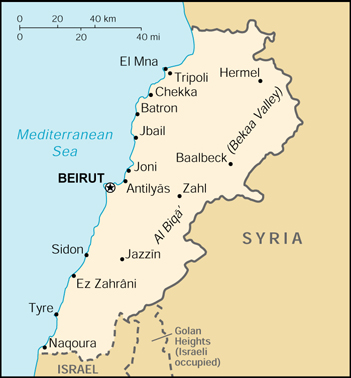Lebanon, a country in West Asia, is in a special place where the Mediterranean Sea and Arabian peninsula meet. It’s a mix of different cultures and people. Lebanon used to have a strong economy, with things like services, farming, tourism, and making things. But then, in the 1970s, there was a big war that hurt everything, especially trading and money stuff. The main port in the capital city, Beirut, got wrecked. There were also lots of problems with politics and people being dishonest, which made the country owe a lot of money. In the 1990s and 2000s, the government and other countries helped Lebanon try to fix things and get better.
Lebanon Sea Ports
- Beirut.
- Chekka.
- Jounieh.
- Selaata.
- Sidon.
- Tripoli.
- Tyr.
- Zahrani Terminal.

Lebanon has about 13 ports that belong to the government, but some are run by private companies. These ports are really important for the country’s money and they add a lot to how much the country makes. People know these ports not just for shipping things but also for fun stuff like good food and going out at night. Tourists, especially from Japan, like visiting them.
The government of Lebanon knows how important the ports are, so they’ve done lots of projects to make them better. After the war, they worked hard to fix up the Beirut port, and it’s been doing well since.
Beirut Port
Beirut Port is in a very important spot, where Asia, Africa, and Europe meet. It’s the most important port in Lebanon and is like a door to the Middle East. Some of the biggest shipping companies in the world use it to move things between ships. It’s really important for sending stuff to countries like those in the Persian Gulf, Jordan, Syria, and Iraq. The government used to own and run it, but after the war, they took control again. Since then, they’ve made it better and bigger. Sadly, in 2020, there was a big explosion there that hurt a lot of people and broke a lot of things, including parts of the city. It cost Lebanon a lot of money.
The Beirut Port is huge, with lots of different parts for different things. It handled 3,000 ships in 2015 and can move about 8 million tons of stuff each year. It can also handle over a million shipping containers every year. There are big areas for ships to stop, with lots of equipment to help move things on and off the ships. They’re still working on making it even better.
Dora Terminals
Dora is a place near the Beirut port with 8 terminals that belong to private companies. They’re mostly for moving oil and gas.
Amchit Port
Amchit Port is a smaller port near Beirut that’s mainly for bringing in clean oil products.
Tripoli Port
Tripoli Port is the second busiest port in Lebanon after Beirut. It’s not far from the border with Syria. They’re working on making it bigger with a new area for ships and a place for companies to sell things without taxes.
Sour Port
Sour Port is a small port in the south of Lebanon. It’s only open during the day and isn’t good for big ships. It mostly sees small fishing boats and private boats.
Jounieh Port
Jounieh Port is a medium-sized port not far from Beirut. It’s mostly for small ships and pleasure boats. Lots of tourists like going there.
Zouk Terminal
Zouk Terminal is near Jounieh and is for moving electricity and other stuff.
Jieh Port
Jieh Port is about 25 miles from Beirut and mainly deals with oil. It’s got a big area for ships to stop and unload.
Chekka Port
Chekka Port is in the north of Lebanon and mainly deals with cement and other building materials.
Sidon Port
Sidon Port is mostly for dry goods and fuel. It’s got a place for boats to stay and a place for fixing them.
Zahrani Oil Terminal
Zahrani Oil Terminal is near Sidon and is for moving oil from big ships to pipelines.
Selaata Port
Selaata Port is a medium-sized port for moving different stuff. It’s got a big area for ships and things like warehouses.
Sidon Oil Terminal
Sidon Oil Terminal is near Zahrani and is also for moving oil from big ships to pipelines.
Selaata Port
Selaata Port is a medium-sized port for moving different stuff. It’s got a big area for ships and things like warehouses. It’s good for ships carrying general cargo, big loads, and oil or chemicals. They’re making it better to handle even more ships and cargo.
Conclusion
These are the main ports in Lebanon. They’re really important for the country’s economy and for making it better. They help bring in and send out lots of things, and they’re always getting better to handle even more.


Latest Products
2J55 Magnetron
M1568B Magnetron
MSF1422B Magnetron
CETC VAI8 AIS SART